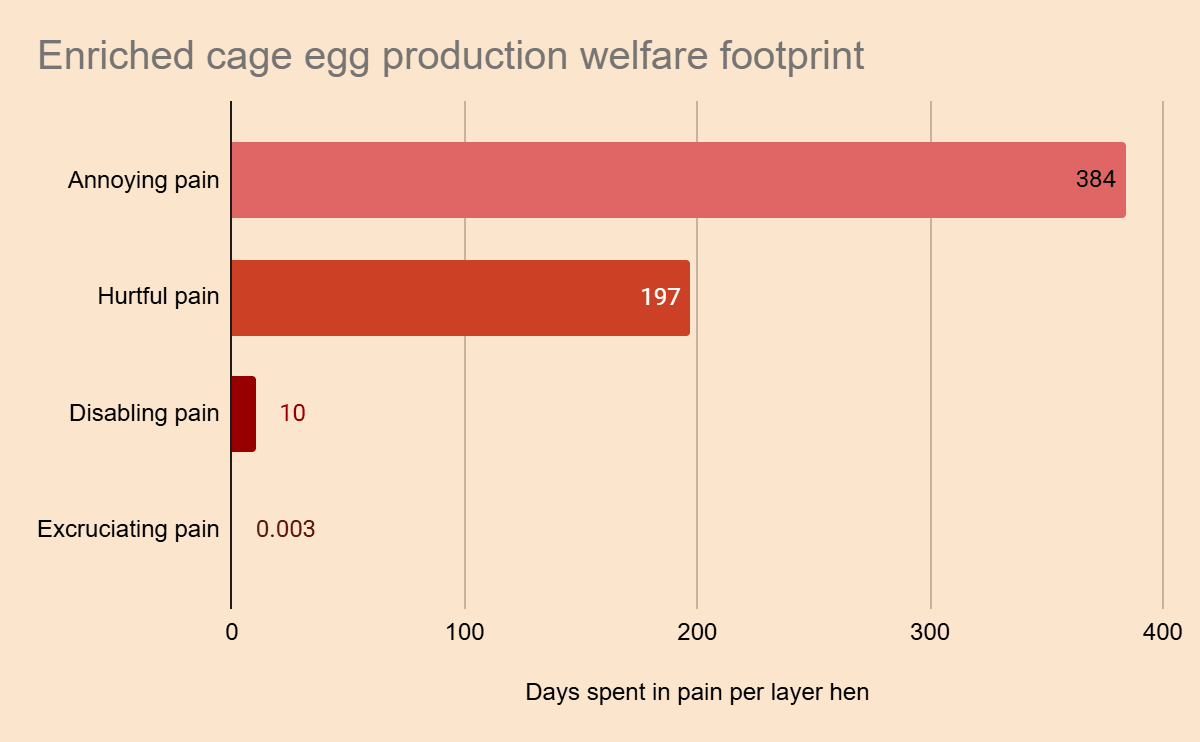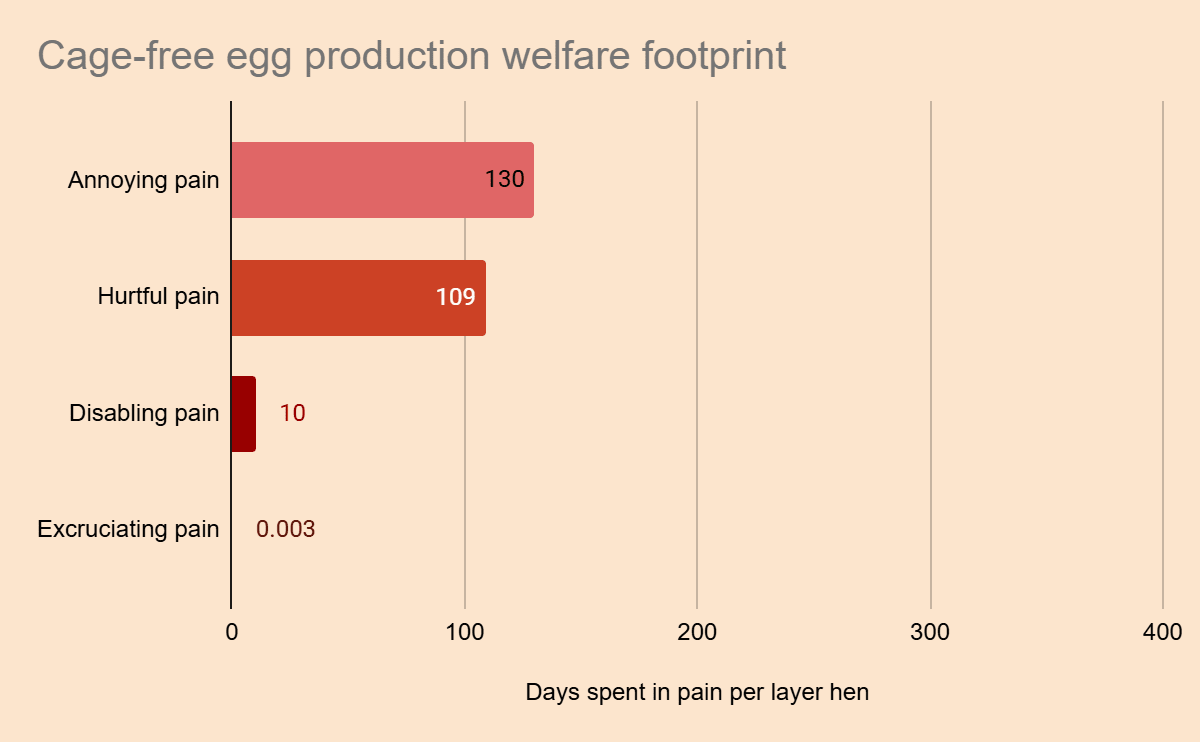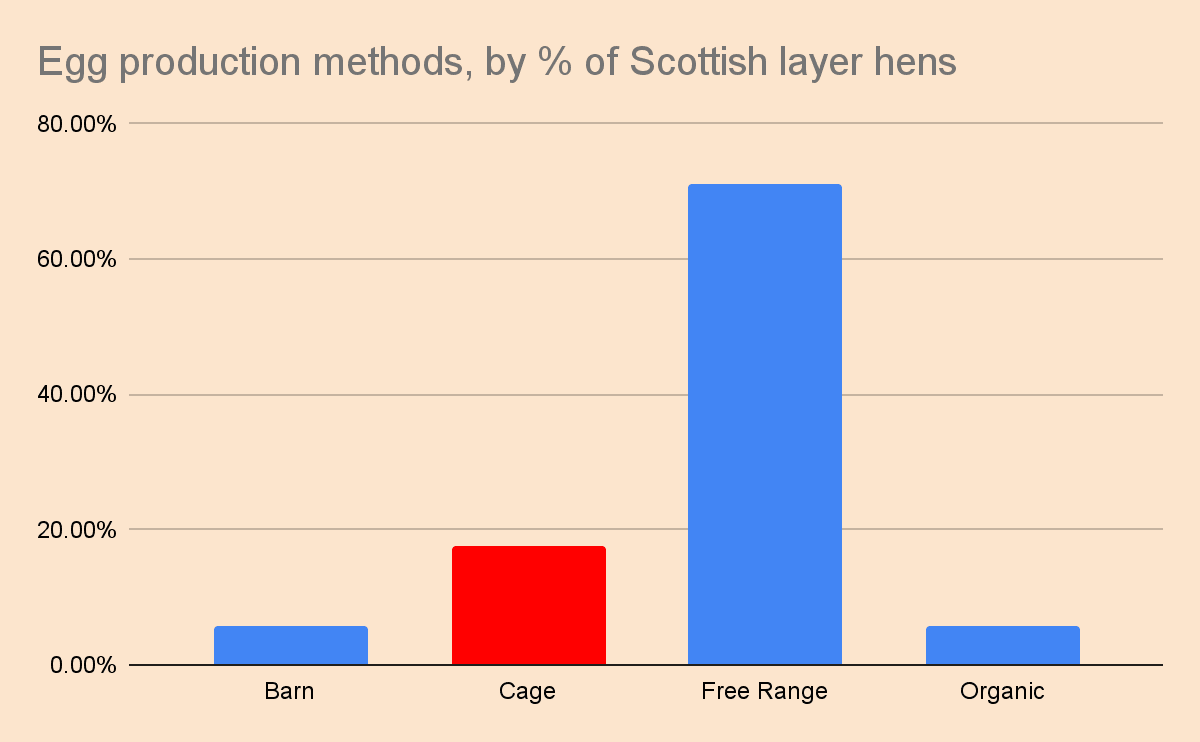(You can read this post as a Google Doc. You might find this easier to share with animal-sympathetic non-EAs. Also: I work at Rethink Priorities, but I'm writing in a personal capacity.)
A few weeks ago, I shared some suggested responses for a Defra consultation on welfare labelling. I was really pleased to hear that many EAs and animal rights advocates wrote in to support the proposal. I’m now sharing a similar opportunity: ~ten minutes of your time to speak up for ~4.5 million caged chickens.
If you want to help, you have less than 48 hours to get this done!
What’s the public consultation?
The Scottish government is running a public consultation on their proposal to ban cages for layer hens. Agriculture is a devolved power so Holyrood have responsibility for Scottish animal welfare.
Let’s be clear: cage-free chickens have dramatically better lives than caged chickens. Liberating caged chickens alleviates a great deal of suffering.[1]
 |  |
Over 80% of Scottish layer hens are already cage-free. A greater proportion than across the whole UK, this is a testament to hard work from animal welfare campaigners. 
- Corporate commitments might not last forever. A ban can lock in campaigners’ hard-won victories and pre-empt businesses backsliding
- Corporate commitments and welfare schemes might not always be met or enforced. A recent investigation from Animal Rising revealed that at least one English farm kept chickens in cages despite being RSPCA Assured. We could have greater trust that chickens are truly free from cages if they were banned
- The pro-animal movement will have another win, which builds political momentum for our cause. The Scottish government notes that Luxembourg and Austria have already banned cages; that Germany, the Czech Republic and Slovakia are phasing them out; and that Australia aims to ban cages by 2036. If Scotland is attentive to other governments’ bans, then other governments might pay attention to a Scottish ban
- 18% of Scottish layer hens are still so many – over a million – birds. None of them deserve to live their whole life condemned to a cage.
The government are considering three options:
- 2030 ban on enriched cage production
- 2030 ban on installing new cages, and 2034 ban on enriched cage production
- “Information campaign aimed at consumers to encourage all retailers who have not signed up to the retailer pledge and caterers to commit to stop stocking/selling eggs or egg products from enriched cages by 2034”[2]
Option (2) is the default because the government thinks this best balances improving bird welfare and supporting the egg industry. This proposal is what the public consultation is about.
I think pursuing (2) rather than (1) is really disappointing. Four more years of cages means up to 4.5 million layer hens will live their lives behind bars.[3] And there are only fifteen farms currently keeping caged layer hens in Scotland; do they really need four more years of warning? An instant ban on installing new cages and a 2030 ban on all enriched cage production seem eminently reasonable to me.
How you can help
You can access the public consultation here and submit your response by 25 June 2024. You don’t have to be Scottish to respond.
The consultation is divided into several pages. Only the ‘About you’ page is necessary.
| Page | This is about | Number of questions |
| Animal welfare | Will a ban on cages help chickens express natural behaviours and improve other welfare outcomes? | 2 questions |
| Policy proposal | Do you agree with the proposal? | 5 questions |
| Capital costs | Estimating cost to convert cage farms to cage-free | 1 question |
| Production costs | Estimating cost per egg under cage and cage-free production methods | 1 question |
| Laying hen industry | Soliciting industry views | 9 questions |
| Pullet rearing | 3 questions | |
| Breeder layers | 3 questions | |
| (Barren) battery cage production | 3 questions | |
| Further comments | Environmental, socio-economic, and other impacts | 3 questions |
| About you | 9 questions (but they’re easy!) |
You should definitely answer the ‘Policy proposal’ questions. I would suggest writing something like this – but you might want to edit to best reflect your views (e.g. emphasising your personal stake, if you live in Scotland; or removing language about humane farming, if you’re an abolitionist).
| Question | Suggested response |
| Q3. Do you agree with our proposal to introduce a ban on the installation of new enriched cages across the laying hen sector (laying hens, pullets and breeder layers) in 2030? | Yes [Please explain your answer:] Banning these cages aligns Scotland with the animal welfare standards that the Scottish people endorse, and that are popular across Europe. No chicken deserves to live its life in a cage, and it’s shameful that more cages will be built and more animals kept in these conditions. The installation of new enriched cages should be banned as soon as feasible. |
| Q4. Do you agree that a 10-year transition period, starting in 2024 to a full ban on enriched cages in Scotland across the laying hen sector in 2034 (laying hens, pullets and breeder layers) is the right phase in period? | No, it is too long [Please explain your answer:] Four more years of cages could mean that millions of chickens live in intolerable, inhumane conditions. If there are only fifteen Scottish farms currently keeping hens in cages, as your data shows, then it seems extremely reasonable to fully transition by 2030 – if not sooner. Every chicken deserves a happy life, and changes need to come as soon as possible. |
| Q5. Do you agree with the proposal to ban (barren) battery cages in 2030: for smaller scale commercial units or hobby-keepers with fewer than 350 laying hens? | Yes [Please explain your answer:] Chickens deserve humane treatment, whether they’re on a mega-farm or a hobby-keep. The scale of the operation makes no difference to their moral worth. |
| Q6. Do you agree with the proposal to ban (barren) battery cages in 2030: for breeder layers? | Yes [Please explain your answer:] Breeder layers deserve a humane living environment, like every chicken and every animal. Banning cages for breeder layers will improve their welfare, and bring Scotland into alignment with modern sentiment on animal welfare. |
| Q7. Do you agree with the proposal to ban (barren) battery cages in 2030: for pullets? | Yes [Please explain your answer:] I feel especially sympathetic for pullets: babies kept in cages. It’s so important that farms provide a humane living environment for pullets for the sake of their healthy development. Banning cages will promote higher welfare across the entire life of layer hens. |
You could also consider answering these ‘Animal welfare’ and ‘Further comments’ questions. I would suggest writing something like this (but again, I recommend editing to fit your personal views).
| Question | Suggested response |
| Animal welfare | |
| Q1. Do you think that a ban on cages and a move to non-cage systems will allow birds to better express their normal behaviours? | Yes [Please explain your answer:] Of course: chickens don’t naturally live in cages, and everything about life in a cage is abnormal. A move to a non-cage system will give birds more space to express normal behaviours like foraging, dust-bathing, perching and nesting. These behaviours are essential for their well-being and, without the ability to express them, layer hens are suffering without their full five freedoms. |
| Q2. Do you think that housing birds in non-cage systems will improve other welfare outcomes in addition to normal behaviours? | Yes [Please explain your answer:] Birds in non-cage systems are less likely to suffer from bone fractures, muscle atrophy, and other physical problems; are less likely to feel stressed and express stress-related behaviours like feather pecking and cannibalism; and are happier because they can interact freely with fellow birds. A shift towards a cage-free system will result in healthier, happier birds across a wide range of welfare outcomes.
|
| Further comments | |
| Q24. Please provide any comments or evidence you feel should be considered concerning the socio-economic impact the proposed policy may have on both producers and consumers. | Consumers generally want to buy higher welfare animal products but don’t always know which products are best, due to information asymmetries or misleading labelling (e.g. a recent investigation found caged chickens on RSPCA Assured farms). A ban can help consumers always buy higher welfare goods. |
| Q25. Please provide any further considerations you feel should be noted when considering this policy proposal. | When we think about social impacts on producers and consumers, we should also think about impacts on animals. Layer hens are living, feeling beings who have ended up as products in our food system. The Scottish government should therefore consider animal suffering as an externality to be mitigated through public policy, and should seek a cage ban as soon as feasible.
Please see more information about the welfare of caged vs cage-free birds here: https://ourworldindata.org/do-better-cages-or-cage-free-environments-really-improve-the-lives-of-hens |
Will your response influence decision-makers?
I'm unsure! The Scottish government certainly seem fixed on option (2), a 2034 ban. It's probably also worth noting that the Scottish government isn't very stable right now. But nonetheless, I think it's well worth completing your response; even if you think there's a very small chance that you influence the government, it's only ten minutes of your day to potentially improve millions of lives.
You might be interested in Max Carpendale's research into whether public consultation responses can influence decision-makers, and Kirsten's comment on her experiences aggregating responses.
- ^
- ^
The non-regulatory option is clearly the weakest here, but I would be interested in governments with a lower proportion of cage-free layer hens running information campaigns like this, because that could free up counterfactual funding within the pro-animal movement.
- ^
4.5 million calculated from 4 * number of caged layer hens in February 2024 (1,128,631). Take this as an upper bound because layer hens generally live 18 to 24 months, rather than one year, and because we should expect the number of caged chickens to wind down rather than suddenly drop off.

It took me 24 minutes from when I decided to start (half-way through reading this post), but that could be reduced if I had these tips at the start.
I am not responding on behalf of an organization, but I am mostly pasting a template from a policy proposal suggested by an acquaintance here:
https://forum.effectivealtruism.org/posts/mooBq4A3Hd8ttTyAY/ten-minutes-to-speak-up-for-4-5-million-caged-chickens
I am from Norway, but I care to write this response because I don't wish for the animals to suffer unnecessarily. I can answer on behalf of the policy response if you wish to contact me, or you may contact the author of that document.
On Chrome:
1) to the right of the URL bar, select Cookies and site data → Manage on-device site data
2) delete both cookies there
3) refresh page, and you will now be prompted again
Thanks for completing the consultation, and for your time assessment (I hope that helps others judge accurately!)
I did it too, thank you so much for posting! I did not use your templates at all, it is easier to stream-of-consciousness write about why I think cages are bad.
Done! Thanks a lot, Ben, for bringing this opportunity to our attention and explaining how to navigate the survey. Fingers crossed for a positive outcome for Scottish chickens <3
Edit: It took me around 15 minutes to read through the main points of the forum post and complete the survey (I only did the pages on Animal Welfare, Public Policy, Further Comments and About You). The survey website is very easy to navigate.
Done! Thanks for sharing this!
Executive summary: The Scottish government is considering banning cages for layer hens, and the author urges readers to participate in a public consultation to advocate for a quicker and more comprehensive ban to alleviate chicken suffering.
Key points:
This comment was auto-generated by the EA Forum Team. Feel free to point out issues with this summary by replying to the comment, and contact us if you have feedback.